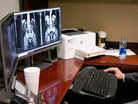Orlando Health pioneers late stage skin cancer treatment

Clinicians at the Orlando Health Cancer Institute are using a groundbreaking treatment for late-stage cancer that uses a patient’s own tumour cells as a way to combat the disease.
The treatment is called autologous TIL therapy, and helps patients with melanoma, one of the most aggressive types of cancer that quickly spreads throughout the body.
TIL therapy is administered during a single hospital admission. Doctors say the results can be drastic, shrinking tumours in a matter of weeks with no further treatments. . “We’re taking the T cells from the patient’s own tumour and expanding these cells into a clone army" explains Sajeve Thomas, MD, Medical Oncologist at the Orlando Health Cancer Institute.
"The number of T cells that can be produced is anywhere from a billion to 150 billion cells. We can isolate cancer-specific T cells from a patient’s tumour, expand them and infuse the T cells back to the patient, along with additional medications to turn on the immune system and make it more active against the cancer.”
The clinicians believe the treatment can offer a chance at survival for patients who have run out of options. A recent clinical trial found that tumours shrank or remained stable in four out of five patients, with significant results often evident within 90 days of the treatment.
“When patients respond well to the treatment, you can see those tumours melt down on the first CT scan” Thomas says. “Their responses can continue to regress over time. With one of my patients, Toni English, I remember walking in and looking at a tumour in her lung and by her kidney, and saw those tumours shrink by more than 50%. In her most current scans, they’re non-existent. That's exciting! We’re helping patients in their fight to beat back cancer.”
Toni English had been diagnosed with an aggressive form of melanoma in 2015. She had been in remission for two years, but when her cancer returned and didn’t respond to another round of treatment, she felt that she was running out of chances.
After hearing about the Orlando Health Cancer Institute, and its reputation for cancer treatment, English approached Thomas, who suggested she try TIL therapy.
“We had pretty much hit the end of the road for treatment, we had tried everything that I knew was out there” she said. “That day, Dr. Thomas came in and told us that there was an experimental new treatment, a clinical trial at Orlando Health. He asked me if I would be interested in trying it and I said, ‘If it's there, I want to do it. If it can help somebody else diagnosed with the same cancer, I'm doing it.’"
Six weeks after her treatment her scans looked positive. Four years later, she is still cancer-free, and is now an advocate for TIL therapy, helping other melanoma patients learn about it through support groups for people all over the world.
She credits Thomas and the breakthrough therapy for saving her life. “It has given me life back. My husband and I have lots of things we want to do together" she said.
Researchers are now working to expand TIL therapy for use in fighting other types of cancer, with trials ongoing for lung, cervical and head and neck cancers.
